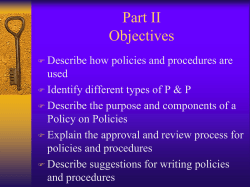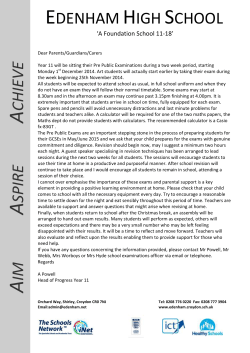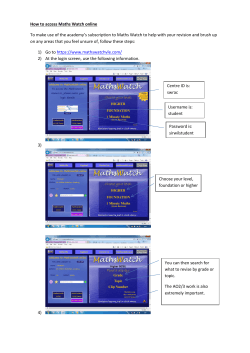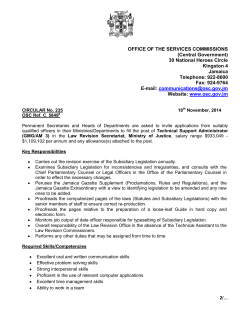
ONSLOW ST AUDREY`S SCHOOL
ONSLOW ST AUDREY’S SCHOOL YEAR 8 REVISION GUIDE 2015 Year 8 Exam Timetable Monday 27/04/15 Tuesday 28/04/15 Wednesday 29/04/15 Thursday 30/04/15 Friday 01/05/15 English 8.50-9.50 1 hour Science 8.50-9.35 45 mins Maths Paper 1 8.50-9.40 50 mins PE 8.50-9.40 50 mins Maths Paper 2 8.50-9.40 50 mins BREAK 10.40-10.55am BREAK 10.40-10.55am BREAK 10.40-10.55am BREAK 10.40-10.55am BREAK 10.40-10.55am CDE 11.00-11.50 50 mins Spanish 11.00-11.50 50 mins History 11.00-11.50 50 mins Music 11.00-11.45 45 mins Geography 11.00-11.50 50 mins Lunch 12.35-1.10 Lunch 12.35-1.10 Lunch 12.35-1.10 Lunch 12.35-1.10 Lunch 12.35-1.10 French 1.15-2.05 50 mins When students are not in examinations, they will be in lessons. Where examinations run over two lessons, then the teachers timetabled for the second lesson will be in the Hall for that period and take students back to their lesson afterwards. Year 8 Revision Guide Revision Tips Revision Tips Unfortunately, there is no easy way to pass exams, but we can give you lots of tips on how to use your study time more effectively. This guide has been written to remind students about how to revise and how to learn. Many of the learning and revision strategies in this booklet are applicable to KS3 but also to the final examination of a degree level course. Although this booklet contains superb advice, great tips and fantastic study skills, the guide isn’t as important as the person reading it – YOU! It is you who have to put them into practice and apply them to your work. If you do, we’re sure that you will improve your performance and your study skills. But to get better at something, you have to practise! So, over to you – happy studying and good luck! Revision means ‘to look at again’. You need to look at things again as part of learning as well as in preparation for exams. But we need active ways to do this ‘looking again’. Revision gives time for reflection and learning. You can start to see the big picture, you can add in more details and examples. You may discover something you still don’t understand and you can ask your teacher about it again. The idea is to revise each major section of your work shortly after you have finished it. For instance, you could draw a Mind Map of each major topic you cover. Keep the Mind Maps because they will be very useful for revising before exams. HOT TIP: Be active and change the way you think. WHY? • • • • • Revision helps learning Revision increases your achievement in exams Achievement in exams gives you wider choices later on Achievement will make everyone proud of you! You will feel great! 1 Year 8 Revision Guide Revision Tips It is important to be positive about yourself because people who think they can do well find it easier to learn. Think about five things which you felt good about doing – scoring a goal, asking someone out … think about how you felt when you did those things… …and get yourself into a positive frame of mind. HOT TIP: Get yourself a vision of success. WHEN? Make sure you know when your exams are. Teachers will revise with you and give you advice about how much revision to do, what you should revise and many will give you special notes to help with revising. Make yourself a revision timetable. • • • • • • Fill in leisure, relaxation and family commitments Put in some sessions that you can devote to revision Share out the available revision sessions between your subjects Allow extra sessions if you know some subjects will take longer than others Vary the subjects – don’t do all your Maths revision on day one! Here’s an example for one weekend: Saturday Sunday Morning Football English CDE Morning Maths Geography Lunch at Gran’s house Afternoon Science Languages Still at Gran’s house Evening Video French History The ideal length to revise one topic is 25 to 45 minutes. You remember more at the beginnings and the ends of sessions, so create more beginnings and ends by stopping for a brief break or doing a brain gym exercise. HOT TIP: Stop and start – create brief breaks. WHERE? The ideal study room is light, airy and quiet, with shelves and a desk. Some people are lucky enough to have this and enjoy working in it. Don’t worry if you haven’t got this. You can still try to get some of the elements. Vary your revision place. It’s a good idea to put up posters, lists and post-it notes in other places in the house. Some students find they revise well with friends and it is a good idea to do this sometimes as a bit of variety and fun. Ban the television! Television is too distracting, so make sure it is turned off when you are working. Remember to keep a space in your revision timetable for your favourite programmes. 2 Year 8 Revision Guide Revision Tips Lots of students find that some background music helps the revision process. Classical music such as Mozart can help to stimulate your brain waves. Avoid music with lyrics as you are likely to concentrate on these rather than your work! HOT TIP: Don’t forget the Ideal Study Conditions for revision. HOW? There are three easy steps to doing revision well: • • • Change Challenge Treats The first step is to try change. By changing what is in our exercise books or textbooks into a different form, we kick start our brains into action – we start thinking about new ways of presenting and digesting the information and start learning. Ways to change things: • Outline cards • Make diagrams • Labelled drawings Outline Card • • Time-lines (for history) • Mind maps • Charts and flowcharts (for processes) • Audio tapes (great for languages) • Mnemonics • Use colours and highlighters • • Spider Diagram HOT TIP: Flick through outline cards before the test 3 Year 8 Revision Guide Revision Tips We work best when we are faced with a challenge. Challenge yourself to really sort out a topic that you have found difficult. • • • • Will taking a new approach and turning it into a chart, diagram or Mind Map help? Get someone to test you after you have learned something new. We learn extremely well when we have to teach someone else – why not try teaching one of your parents, a brother or sister, your grandparents or even your friends? Get them to ask you questions about what you have just taught them – can you answer their questions? HOT TIP: Believe in yourself – you CAN do it! Don’t forget to allow yourself some treats. Break up your revision sessions and plan some treats to look forward to: fruit, chocolate, a drink, ten minutes in the garden, glancing at a magazine, going for a walk…whatever will motivate you. Remember, breaking up your revision gives you more stops and starts and more stops and starts increase your learning. Relaxation is important to help you stop feeling the pressure of exams and getting stressed. Find a simple technique that works for you and practice using it when you are stressed or can’t sleep. Have you tried any of these? • • • • • • • • • • A warm bath Visualising yourself passing the test Brain gym exercises Stroking a pet Deep breathing Meditating Going for a walk Asking someone to give you a head massage Yoga Losing yourself in some soft music? HOT TIP: Feed your brain! Fresh fruit, water, fish and vegetables give you brain power! 4 Year 8 Revision Guide Creativity Design & Enterprise Creativity, Design & Enterprise For this exam you will need a pen, pencil, rubber and ruler The CDE examination will: • Last for 50 minutes • Be taken in the Hall Revision: • • To support your revision you may wish to photocopy or photograph pages from your journal/folders Your teacher may suggest other resources e.g. the CDE website, shared area or the internet Topics to be covered are: • Design process • Product Analysis • Hygiene, health and safety in the food room • Stitching techniques and equipment • Ugly dolls • Arts Award (Harry Potter work) • Pop Art • Business • Computer Science 5 Year 8 Revision Guide English & Modern Foreign Languages English Reading Exam • • In the table below are the AFs (Assessment Foci) for your English exam. Choose from the independent revision activities to practise the skills required for each AF. Exam Length 45 minutes (10 minutes planning time/ 35 minutes writing time) Skills Assessed AF2 – your ability to understand, describe and select information from texts. AF3 – your ability to deduce and interpret information and ideas from texts Independent Revision Activities • Complete the ‘Understanding Information from Texts’ activity sheet on the ‘Revision – KS3’ page of the English Faculty website • Find and read a newspaper or magazine article. Summarise the five key points that are being made in that article • Complete the ‘Interpreting Information from Texts’ activity sheet on the ‘Revision – KS3’ page of the English Faculty website. • Using the same article you used for AF2 (above), make a list of five things that the writer wants us to think that are NOT clearly stated in the article (i.e. what is being suggested or implied?) AF5 – to explain • Complete the ‘Using Language Effectively’ activity sheet and comment on on the ‘Revision – KS3’ page of the English Faculty writers’ use of website. language at word • Using the same article that you did for the activities and sentence above, pick out individual words from the article. Why level have these been used? What ideas are linked with these words? What does the writer want the reader to think when they read these words? Have you visited the English Faculty website yet? Key Stage 3 students must use accurate punctuation and grammar to achieve a Level 5 or above in their exam 6 Year 8 Revision Guide English & Modern Foreign Languages French VOCABULARY TOPICS • Describe where you live: type of house, the country you are from, the weather SPORTS AND HOBBIES: • • to say what sports and hobbies you and other people do on different days and at different times. To say what you like to do as well as what you do and with whom. SCHOOL: • • To be able to tell the time in French to describe your school day How to say what school subjects you study and what you think of them. Give your opinion about them. TARGETS For a Level 3 you need to use: • Connectives (et, mais, car, parce que) • Variety of opinions and reasons For a Level 4 you need to add in: • Varied vocabulary to provide extra details • A variety of different verbs in the present tense, correctly changing the spelling according to who you are talking about For a Level 5 you would need to use the near future tense. HOW TO LEARN THE VOCABULARY: Look - Say - Cover - Write - Check: Look at the word and its meaning, Say the word to yourself, Cover it up, Write it down, Check it. Sticky Notes: Put post it notes around your bedroom on places where you look regularly (e.g. mirror in bathroom). Vocabulary Ranking: List new vocab from the easy ones to the most difficult. Spend most time learning the most difficult one. 7 Year 8 Revision Guide English & Modern Foreign Languages Spanish TOPIC LEARNING OUTCOME KEY VOCABULARY 1. WHERE I LIVE 2. HOME & MY BEDROOM To be able to talk about your home and Vivo en el campo, la costa... Mi casa es where it is. To be able to talk about ... your house and your bedroom Mi casa tiene … En mi dormitorio hay una cama, una mesa... 1. TOWN & PLACES IN TOWN 2. DIRECTIONS TO A PLACE To be able to identify different places in town. To be able to give and understand directions Voy al polideportivo, al parque, a la playa ... ¿por dónde se va...? Siga todo recto; tome la primera a la derecha... 1. SPORTS 2. FREE TIME ACTIVITIES To be able to talk about sports and your hobbies. To be able to give opinions and reasons En mi tiempo libre monto en bici/ voy de paseo/ nado en el mar, etc. Me encanta(n)..., me gusta(n) mucho..., no me gusta(n) nada porque ARRANGING TO GO OUT To arrange going out. To accept or decline an invitation. To be able to read the time ¿Adónde quieres ir? A la bolera/ al cine/ al parque de atracciones, etc FOOD To express opinions and say why. To buy food and drink in a shop. Restaurant talk ¿Te gusta…? Sí / no porque… ¿Cuánto cuesta? Cuesta... ¿Tiene ...? Remember to use espanolextra User name: onslow15 Password: onspanish 8 Year 8 Revision Guide Humanities & Music Geography You need to be able to show a good understanding of the following topics, and know the key words and definitions within each topic. China • • • • • Where is China and be able to name some attractions of China Why the one child policy was introduced How the one child policy was implemented What the consequences of the policy were Know the benefits and disadvantages of the Three Gorges Dam Ecosystems • Food chains and food webs • How plants and animals have adapted to their environment e.g. lianas wrap around trees to reach the sunlight • How people are damaging ecosystems e.g. building roads • What we can do to reduce deforestation • What does sustainability mean? Coasts • • • How the sea shapes the land: you need to know the following key terms: erosion and types of it (abrasion, attrition, hydraulic action, solution), transportation and types of it (traction, saltation, suspension, solution) What conflict there may be at the coast and why? What are the benefits and disadvantages of a large leisure complex in a small coastal town? LEVELS Level 4 You understand how you can improve and damage the environment Level 5 You can describe human and natural processes and how these lead to changes in the environment. You understand interdependence and how our actions affect others Level 6 You understand how people may wish to use the same environment in different ways, and often conflicting ways. You can suggest sustainable ways to manage the environment Level 7 You can explain how people may wish to use the same environment which can often create conflict; you can also describe some ways in which people can manage the environment to avoid conflict. You can explain sustainable ways to manage the environment 9 Year 8 Revision Guide Humanities & Music History There are three main topics that you should revise: • • • The Tudors — who they were and how they ruled The Tudors and religious changes Elizabeth and threats to her throne. The areas you need to ‘revisit’ are: • • Who the Tudors were, what their religion was and how they ruled. How Elizabeth managed threats to her throne — Mary Queen of Scots and The Spanish Armada. You will also need to remember how to analyse sources of evidence. For this, you must remember the ‘checklist’: • • • • • • What is the source? (picture/photograph/quotation/writing/artefact/diary, etc.) Is there a date/ is it primary (from the time) or secondary (after the time of the event/person’s life) Who wrote it/how can we tell, e.g., is it signed? What is the motive/purpose (to inform/ persuade/misinform, etc.)? Who is it aimed at (the public/private use/a particular group)? How do we know if it is useful or not? Can we rely on the information we get from the source and does it fit in with other things we know about the period of history? 10 Year 8 Revision Guide Humanities & Music Music In year 8 you will be examined on general musical terms, the ukulele, the keyboard, the 12-bar blues and film music. The Ukulele Revise the chords below. Practice playing them, reading and drawing the chord diagrams. The Keyboard Revise where the notes are on the keyboard and how to play basic chords such as C, F, G and Am. 12-Bar Blues Revise the order of chords in a 12 bar blues sequence in G and the notes in walking bass. 1 2 3 4 1 2 3 4 1 2 3 4 1 2 3 4 G G G G 1 2 3 4 1 2 3 4 1 2 3 4 1 2 3 4 C C G G 1 2 3 4 1 2 3 4 1 2 3 4 1 2 3 4 D C G G 1 2 3 4 1 2 3 4 1 2 3 4 1 2 3 4 G B D E F E D B G B D E F E D B 1 2 3 4 1 2 3 4 1 2 3 4 1 2 3 4 C E G A Bb A G E G B D E F E D B 1 2 3 4 1 2 3 4 1 2 3 4 1 2 3 4 D F# A B C E G A G B D E D D D D 11 Year 8 Revision Guide Mathematics Mathematics Year 8 Sets 1-3 Year 8 Set 4 Number skills with all four operations Averages BIDMAS Fractions and Percentages of Amounts Solving - all methods Fractions and Percentages of Amounts Angle Calculations Simplifying expressions Properties of Shapes Area of Rectangles, Triangles Area of Trapeziums and Parallelograms Area of Compound Shapes Ratios and Proportion Expand and Collecting like terms Expanding Double Brackets Sequences Money Problems Using a calculator Area and Circumference of a Circle Angles in Polygons Boxplots Nth Term Ordering Numbers Negative Numbers Adding and Subtracting Multiplying and Dividing Equivalent Fractions Function Machines Angle Properties of Shapes Money Problems Solving Equations BIDMAS Multiplying and Dividing with Decimals Scales Fraction Diagrams Money Problems Percentages Area and Perimeter - Counting method Bar Charts Averages - Mean, Median and Mode Multiples and Factors Measuring with a Ruler and Protractor Properties of Polygons Calculating Angles on a Straight line and about a point Calculating Angles in a Triangle Equivalent Fractions Ordering Fractions 12 Year 8 Revision Guide Science Sport & Health Science All students in year 8 will complete a one-hour science exam to assess their attainment and achievement over the academic year. The exam will cover everything your child has learned in year 8, as well as covering many key concepts taught in year 7. Written practical skills will also be covered. The exam is comprised of SAT questions so will prepare students for their end of KS3 exams. Revision Topics • • • • • • • • • • • • Food and digestion Respiration Microbes and disease Ecological relationships Atoms and elements Compounds and mixtures Rocks and weathering The rock cycle Heating and cooling Magnets and electromagnets Light Sound and hearing Revision Tools • • KS3 revision guides BBC Bitesize All students should be completing a minimum of one hour revision a week in addition to their normal science homework. If you have questions or concerns then please contact your child’s subject teacher. 13 Year 8 Revision Guide Science Sport & Health Physical Education Revision Topics All • • • • Boys ONLY • • Girls ONLY • • Health related Fitness (HRF) Preparation for exercise Football Gymnastics. Basketball Handball. Dance Netball. Sports Leadership • Skills and characteristics of sports leaders • Skill drill scenario. Revision Tools • Revise key words • Revise teaching points for specific skills learnt in lessons e.g. the teaching points for a chest pass • Displays around school to help. • Use the internet to revise different sports Students should be doing revision for at least one hour a week. If you have questions or concerns then please contact your child’s subject teacher. 14
© Copyright 2025









